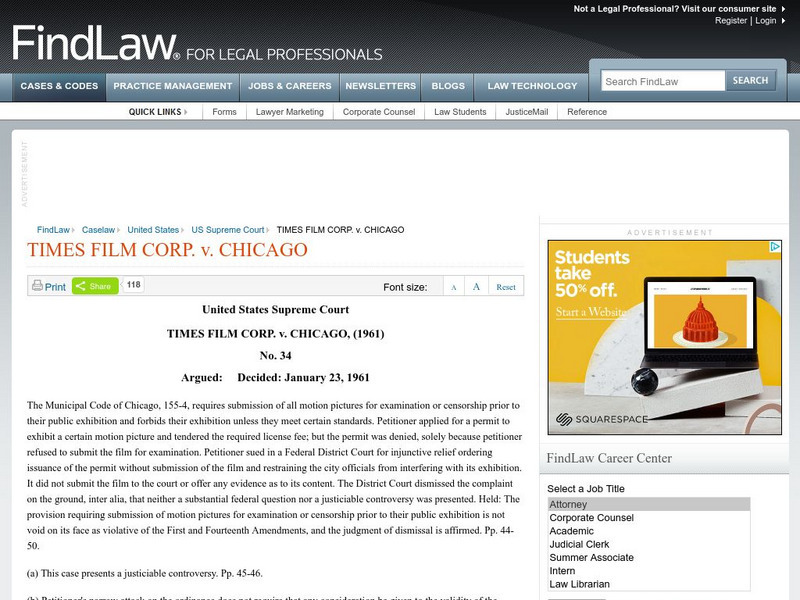Hi, what do you want to do?
Curated OER
Why Burn Books?
Students identify the role of free speech in the selection of library books. They choose one banned book to read and evaluate the reason for its censorship. They create an argument for or against the selection of the book.
Curated OER
What Do You Mean I Can't Read That?
Fourth graders discuss censorship/banned books. They select and read one banned book. They conduct research to find the pro and con positions on the book. They present the book to the class.
Curated OER
Freedom of Information Day
In this Freedom of Information Day worksheet, students complete activities such as reading a passage, phrase matching, fill in the blanks, correct words, multiple choice, spelling sequencing, scrambled sentences, asking questions,...
Curated OER
World War II: America on the Home Front
Eleventh graders gain a sense of historical time and historical perspective as they study the massive campaign that the U.S. government launched to convince Americans to conserve, participate, and sacrifice. They study cencorship, and...
Curated OER
Chicago Tribune vs. US (1942): When Does Freedom of the Press Go Too Far?
Students define freedom of the press in peace and war time. As a class, they identify the need for the public to be informed, but discuss where the line should be drawn to protect national security. They develop their arguments and...
Curated OER
Hidden Messages
Students examine the concept of censorship in authoritarian government and how Japanese and Chinese artists used their work as political commentary. This lesson plan includes possible lesson plan enrichments.
Curated OER
Government Lesson Plan: Lesson Plan 3
Students examine affirmative action policies. They analyze the positive/negative aspects of affirmative action. They study historical development and current status of principles, institutions, and processes of political systems.
Curated OER
Hazelwood v. Kuhlmeier
Middle schoolers read the case text of the Hazelwood v. Kuhlmeier case. Using the text, they discuss the case history and the implications of the verdict. They share their findings with the class in the form of a PowerPoint presentation...
Curated OER
Remember the Bridge: Poems of a People
Fifth graders explore poems of African Americans. They research a famous African American, write a report, create a timeline of events in African American history, create a map of the New World, and research Molly Walsh. After...
Curated OER
The Tank Man
Students explore the events surrounding the confrontation at Tiananmen Square between Chinese forces and "The Tank Man." They discover how censorship affects what the media reports and what the public learns. Students research China's...
Curated OER
Making Choices about Tobacco Use
Students examine the dangers associated with smoking. In groups, they discuss what it means to be addicted to a drug and how the media influences our decisions. After watching excerpts of films, they identify the use of smoking and the...
Curated OER
Primary History: Children of World War 2 Extension Activity- Daily Life
In this World War 2 worksheet, students choose to complete one or more of the three listed extension activities. All activities pertain to daily life of children during World War 2.
Curated OER
Dictators
Students can learn about the elements of a dictatorship through these lessons.
PBS
Billy Wilder: Film Noir Inventor and Genius
This site is a lesson plan focused on post-World War II America and the film making career of Billy Wilder. Details on the Film Noir genre and its reflection of shifting American values. Click to a biography and timeline of Billy...
Louisiana Department of Education
Louisiana Doe: Louisiana Believes: English Language Arts, Grade 9: Fahrenheit 451
Students explore the power of written language to educate and influence others. They read various argumentative essays and engage in virtual collaboration to develop their own arguments. They also research a self-generated question...
Thomson Reuters
Find Law: u.s. Supreme Court: Times Film Corp. V. City of Chicago (1961)
Read the majority opinion of the U.S. Supreme Court in Times Film Corp. v. City of Chicago, a 1961 case that focused on free speech and obscenity.
Curated OER
Educational Technology Clearinghouse: Clip Art Etc: Anthony Comstock
Comstock served in the Civil War and created the New York Society for the Suppression of Vice. He is also famous for the Comstock law and the term comstockery meaning censorship because of perceived obscenity or immorality.




















